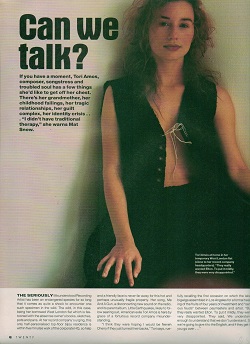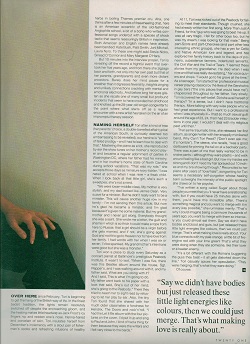|

songs | interviews | photos | tours | boots | press releases | timeline
Q (UK)
February 1992
-th.jpg)
Can we talk?
If you have a moment, Tori Amos, composer, songstress and troubled soul has a few things she'd like to get off her chest. There's her grandmother, her childhood failings, her tragic relationships, her guilt complex, her identity crisis... "I didn't have traditional therapy," she warns Mat Snow.
THE SERIOUSLY Misunderstood Recording Artist has been an endangered species for so long that it comes as quite a shock to encounter one such specimen in the wild. The wild, in this case, being her borrowed West London flat which is festooned with the absentee owner's books, sketches, pots and pans. At her record company's urging, this only half-personalised top-floor bijou residence is within five minutes of the corporate HQ, so help and a friendly face is never far away for this hot and perhaps unusually fragile property. Her song, Me And A Gun, a disconcerting new sound on the radio, and its parent album, Little Earthquakes, likely to follow searing suit, American exile Tori Amos is here by gracec of a fortuitous record company misunderstanding.
"I think they were hoping I would be Neneh Cherry if they just turned their backs," Tori says, ruefully recalling the first occasion on which the label bigwigs assembled in Los Angeles for a formal hearing of the fruits of four years of investment and "serious feuds" between paymasters and artist. "But they really wanted Elton. And to put it mildly, they were very disappointed. They said, We understand enough to understand that we don't understand. So we're going to give it to the English, and if they get it, you go over..."
OVER HERE since February, Tori is beginning to get the hang of the British way of life. In the finest bedsit trtadition, the lights remain resolutely switched off despite the encroaching gloom, and the heating makes little headway as Jack Frost's icy fingers nip and redden one's nose. Henna-haired and porcelain of skin, Tori insulates herself from December's inclemency with a stout pair of fisherman's socks and refreshing infusions of healthy herbs in boiling Thames premier cru. Aha, one things after a few minutes of freewheeling chat, here is an American eccentric of the old-fashioned Anglophile school, a bit of a boho who writes confessional songs undercut with a species of shock tactic that seems reassuringly British in inspiration. Both American and English names have already been bandied: Kate Bush, Patti Smith, Joni Mitchell, Laura Nyro. To these one might add Stevie Nicks, Sinead O'Connor and Mary Margaret O'Hara.
But 10 minutes into the interview proper, Tori is revealing off the record a frightful event that overtook her five years ago, and from it she zigzags back and forth, not only into her own past but that of her parents, grandparents and even more distant ancestors. Barely does her mind pause for a breather than it digresses feverishly, insights zinging and unlikely connections crackling with mental and emotional electricity. And before long her eyes glisten as she recalls one of many small but profound incidents that seem to have crowded her childhood and knotted up the 28-year-old singer-songwriter to the point where what starts off as a regular encounter with a new artist has taken on the air of an impromptu therapy session.
NAMING HERSELF Tori after a kind of tree (her parents' choice, a double-barrelled affair typical of the American South, is curiously too embarrassing to be revealed), our heroine is "a kind of failed prodigy - and I had to learn how to deal with that." Mastering the piano as a tot, she reproduced by ear the show tunes on her mother's record player and became a regular adornment of parties in Washington, DC, where her father had his ministry, and in her mother's home state of North Carolina during school vacations. "That was my role," she accepts those days as a miniature ivory-tickler. "I was hated at school when I was nine - a freak child. When I look back at that little girl, she's such a sweetpea; she's not a nerd."
"We were lower-middle-class. My mother is very stylish, and my dad looked like James Dean. Very suave for a minister. But he didn't really want to be a minister. This will cause another huuge row in my family - I'm not sending them this article. But now he's glad he became a minister, and I'm glad because it's given me some material. But my grandmother and I never got along. Everybody thought she was a saint. She wrote me a letter, the guilt and shame in which is so thick it could make a rope from here to Russia: that a girl should be a virgin before she gets married, and if not, she's going against God and not fit to go to Heaven nor to have love from her family. I had words with her when I was six or seven. I'd be spanked. My grandmother's intentions were good but she was a monster."
Tori won a place to study every Saturday as a concert pianist at Baltimore's prestigious Peabody Institute. It wasn't to last. "When I was five, there was this Beatles album around the house, Sgt. Pepper's, and I was walking around with it, and my father said, What are you doing with it? And I said, This is what I'm going to do. My father went back to his paper with a look that said, She's out of her mind; she's going to the Peabody." There they tried to teach her to sight read by refusing to let her play by ear. Also, the tiny Tori found that she shared with her much older classmates a fondness for Hendrix, The Doors and rock'n'roll. "I had the Let It Be album with the four pictures on the cover. I'd put it up and sing to Paul and John. I kind of had a thing for them because they were the writers and I felt very close to the bards."
At 11, Tori was kicked out of the Peabody for failing to meet their standards. Though crushed, she had already written her first song, More Than Just A Friend, for this "guy who was going to beat me up. It was all very tragic. I fell for other boys too, but he was my dream. I was looking for that mate." Being part-Scots and part-Cherokee (and part other less interesting ethnic groups), she has a yen for Celtic and Native American lore and legend, and has explored her family history back to the days of pioneers, subsistence farmers, indentured servants, the Civil War and the Trail of Tears. "I learned these stories from my grandfather. He died when I was nine and that was really devastating," her voice quivers and drops. "I would go to his grave all the time." As a teenager, Tori started her professional musical career by playing classics by the likes of Gershwins in gay bars ("the only places that would have me"), chaperoned throughout by her father. Very slowly, Tori recovered her self-belief. Did she avail herself of therapy? "In a sense, but I didn't have traditional therapy. More talking with very wise people who've had great experience. But I went to a professional around the age of 23, 24, and I had 23 bladder infections in one year. I wouldn't deal with my religious past until then."
That same traumatic time, she released her first album, as singer/writer with her snappily monikered band, Why Can't Tori Read? [sic - Y Kant Tori Read] ("Don't even ask me; it's horrible"). The sleeve, she recalls, "was a good dartboard for pinning the tail on at a bachelor party. There was a part of me that really wanted to be in snake pants - although they were plastic - and walk around feeling like a bad girl. But now my insides are strong and I don't need my hair sprayed out 10 inches and my bra showing through." Reconciled to her piano after years of "love/hate", songwriting for Tori seems a necessary self-purgation whose healing balm outweighs the intensity of the public spotlight she draws on to her psyche.
"I've written a song called 'Sugar' about those people you meet that you'll never have a relationship with, but if you could have 25 minutes alone with them, you'd have this incredible affair. There's something magical and you want to merge with it in every way possible," she ruminates merrily. "That's why I could imagine being a carnivore thousands of years ago; you want to merge with them so intensely you could almost eat them. Say we didn't have bodies and blood and guts, but just released these light energies like colours, then we could just merge. That's what making love is really about. Your blue connects with my pale orange; a little bit of fire-engine red with your lime green! That's what they were doing when they ate someone, like their lover or a beaten enemy."
"It's a bit different with the Romans buggering the guys they beat - it all gets distorted down the line," Tori casually spices her speculation. "They were merging; that's what they were doing."
Of course.
original article
 
t o r i p h o r i a
tori amos digital archive
yessaid.com
|